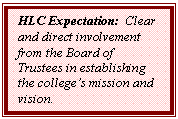

Board of Trustees Involvement
 The Board of Trustees sets direction and establishes policy for the College. It has been active in strategic planning, as illustrated by the following list of recent meeting topics:
The Board of Trustees sets direction and establishes policy for the College. It has been active in strategic planning, as illustrated by the following list of recent meeting topics:
- February 28, 2002, Board Meeting: Budget projections and the use of peer group comparisons for continuous improvement
-
July 9, 2002, Board Retreat: Budget projections, information technology plans, and SVCC’s involvement in economic development
-
January 30, 2003, Board Meeting: Financial projections and construction projects
-
July 3, 2003, Board Retreat: College goal setting, highlights of changes in the instructional program, plans for housing, review of state grant funding, and nursing program attrition rates
-
February 19, 2004, Board Retreat: The College’s financial position and cost analysis, the financial status of Corporate and Community Services, plans to issue funding bonds for capital expenditures, nursing program student attrition rates, and administrative reorganization
-
March 22, 2004, Board Meeting: New mission statement presented
-
September 23, 2004, Board Meeting: Board members introduced to the assessment data collection system and informed of progress made toward meeting HLC focused visit expectations.
-
September 23, 2004, Board Meeting: Measuring academic programs by return on investment, merit pay raises, and charging differential tuition rates for different programs
-
September 26, 2005, Board Meeting: Learning college presentation
-
October 6, 2005, Board Retreat: The new President’s vision and the budgeting and planning process
-
October 24, 2005, Board Meeting: Strategic planning and visioning presentation
The Board of Trustees has also revised several policies related to planning and assessment. To ensure accountability for the new system model, Board Policy and college job descriptions underwent review. Revisions were made to several policies, as well as to administrator and faculty job descriptions. ![]()
![]()
- Board policy 102.01 (Board Philosophy and Objectives) now describes the Board’s support for “. . . the importance of assessing the impact and outcomes of its educational programming.”
- Board policy 109.01 (Duties and Responsibilities of the Board of Trustees) now specifies the Board’s responsibility to “...advance the mission of the College improving learning through implementing the results from assessment of student learning and institutional effectiveness.”
- Administrator job descriptions at all levels now include accountability to “Facilitate the planning and execution of defining target learning outcomes at the course and program level and the assessment of student learning outcomes.”
- The Instructional Staff job description now includes, among other changes, the requirements to . . .
-
- “Participate in the established college-wide process for assessing student learning, which includes generating and sharing classroom assessment data.”
- “In accordance with the College-wide strategic planning process, regularly review the need for courses, programs, and other curriculum changes.”
The Board of Trustees has embraced its opportunity for actively creating the strategic plan that will begin on July 1, 2006. The Board held a planning retreat on January 19, with half of the time scheduled for strategic planning. Thomas Gospodarczyk, Dean of Adult Educational Services, facilitated the strategic planning portion of the retreat where the Board reviewed the current mission statement and did the initial work to outline a College vision statement and strategic goals.
The Board has targeted its February 27, 2006 meeting (after this focused visit report goes to the printer) to finalize and approve the new vision statement and strategic goals. The February date was targeted so the vision and goals could be included in and coordinated with the spring strategic planning cycle.







